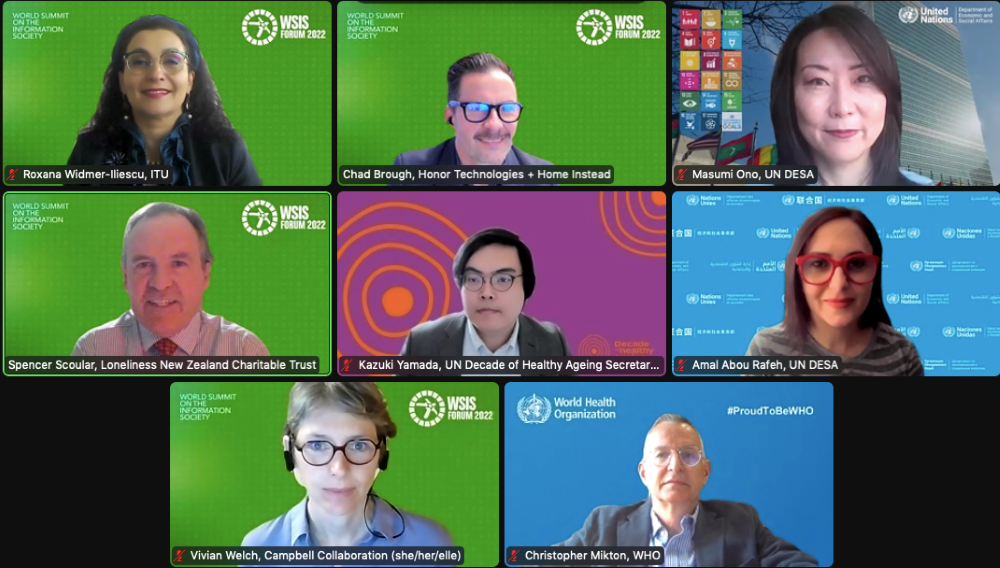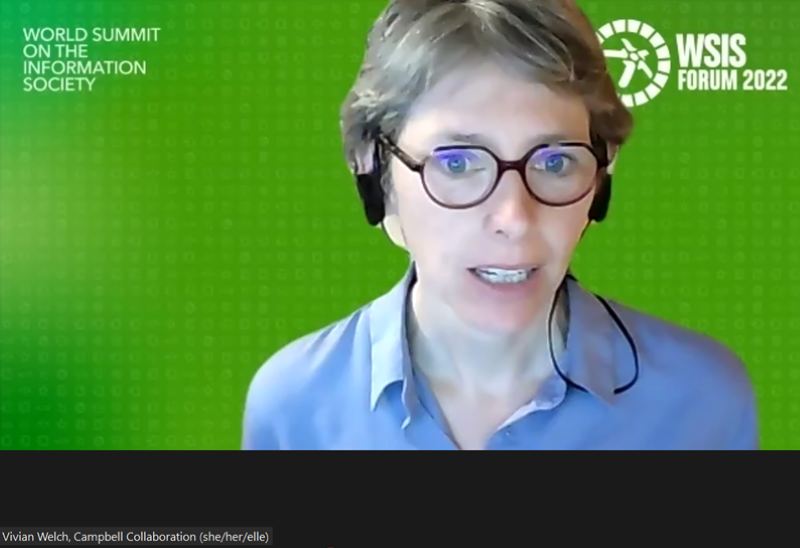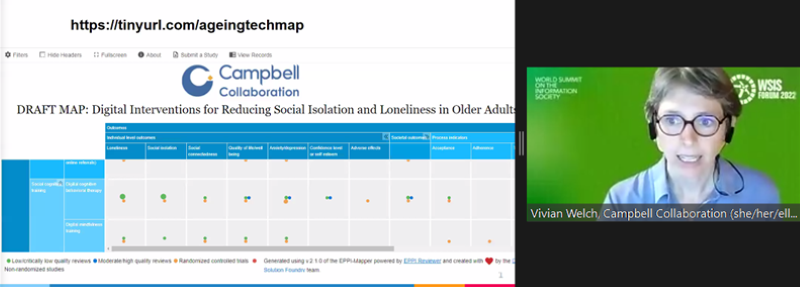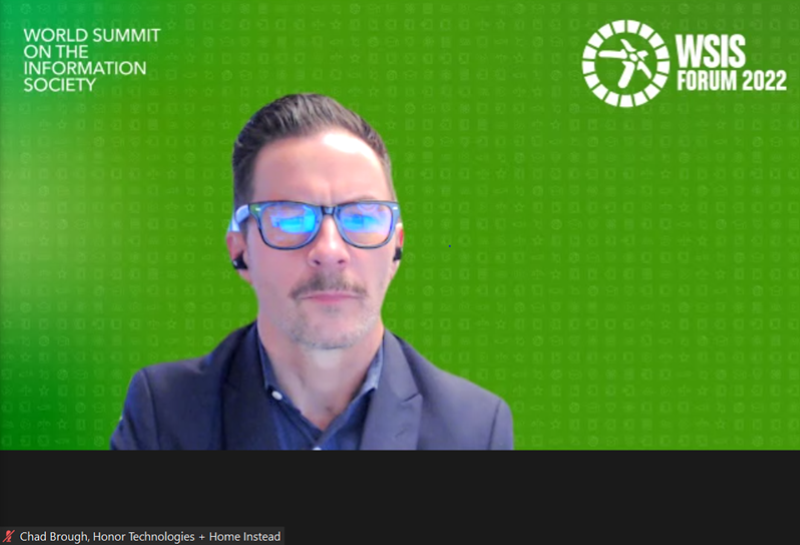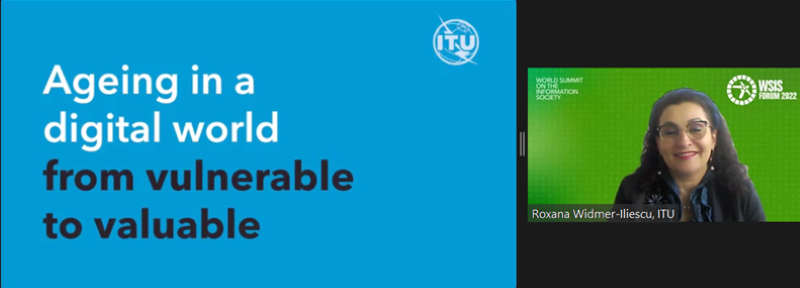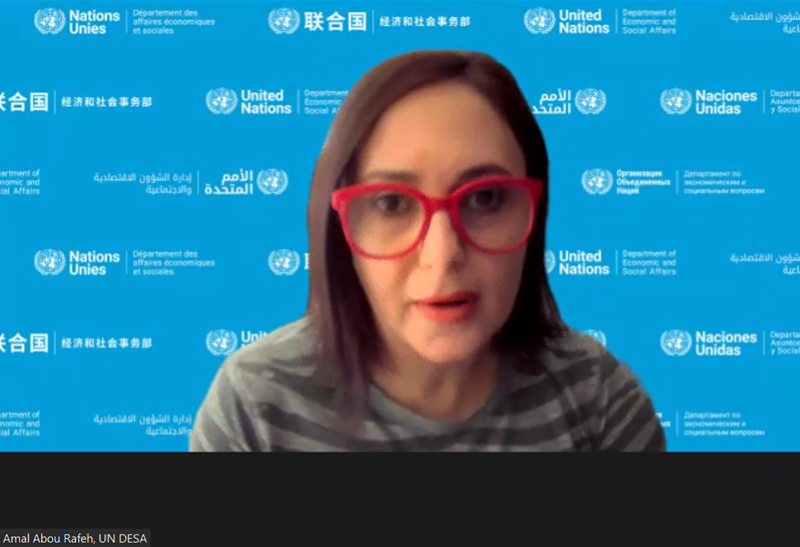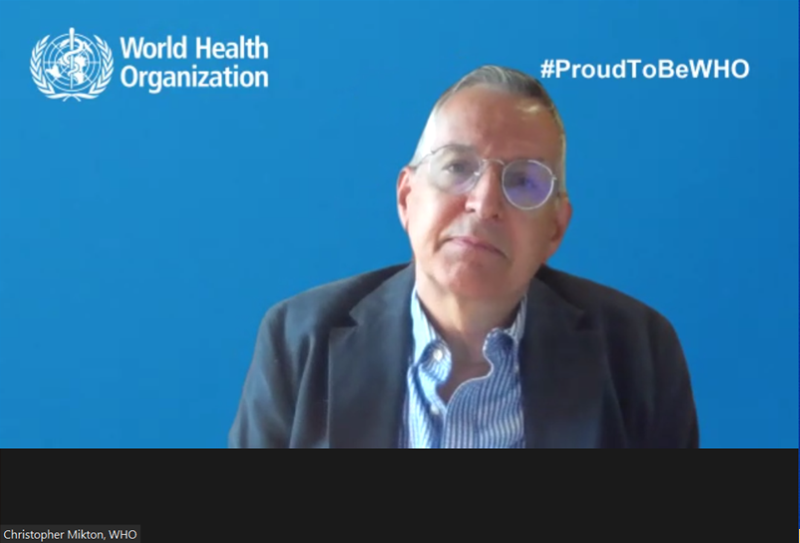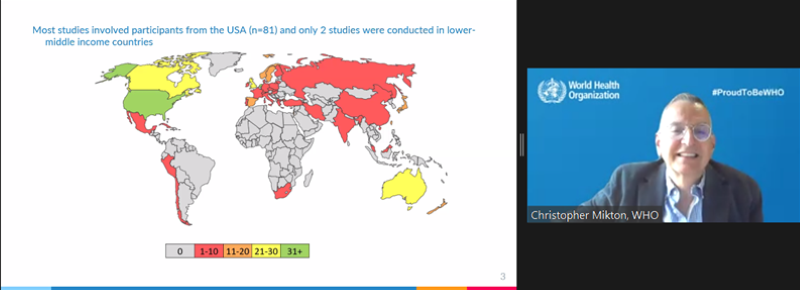Addressing social isolation and loneliness among older persons through digital interventions
Campbell Collaboration / Global Coalition on Ageing / Global Initiative on Loneliness and Connection / International Telecommunication Union / United Nations Department of Economic and Social Affairs / World Health Organization
Session 243
The use of digital technologies to foster healthy ageing has become increasingly important especially in the contexts of the COVID-19 pandemic and accelerating global digitalization. In particular, COVID-19 has exposed the need to address social isolation and loneliness among older people as a growing social, economic, and public health issue requiring coordinated efforts in the context of the UN Decade of Healthy Ageing’s call for cross-sectoral collaboration to improve the lives of older people, their families, and their communities.
This session will consider how information and communication technologies (ICTs) can be best leveraged to address social isolation & loneliness among older people in ways that endure through global COVID-19 recovery efforts. The session will discuss the evidence that underpins digital interventions to address social isolation and loneliness and encourage a multi-stakeholder response bridging policy, research, and practice to ensure older people’s needs for high-quality social connections are met.
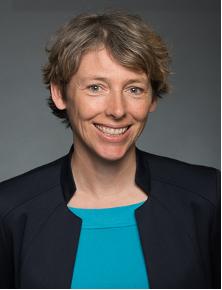
Dr. Vivian Welch is editor in chief of the Campbell Collaboration, Director of the Methods Centre at the Bruyère Research Institute (BRI), and Associate Professor at University of Ottawa School of Epidemiology and Public Health. She co-convenes the Campbell and Cochrane Equity Methods Group and is a co-director of Cochrane-Campbell Global Ageing. She obtained her PhD in Population health and epidemiology from the University of Ottawa in 2010. Dr. Welch’s research interests include methods for reporting and conducting systematic reviews relevant to ageing and health equity. She has led international teams in the development of reporting guidelines for how to assess health equity in systematic reviews (PRISMA-Equity 2012), randomized controlled trials (CONSORT-Equity 2017) and public health guidelines. She has led and contributed to over 30 systematic reviews on global health. She led a new chapter on assessing health equity in the revised Cochrane Handbook, published in 2019.
She was awarded a recognition as one of the top 100 women in Global Health 2018, The Lancet and Canadian Society for International Health and an Ontario Early Researcher Award (2014-2019).

Chad Brough is the Vice President of Healthcare Transformation at Honor Technologies + Home Instead. In his role, Chad leads the comprehensive healthcare transformation strategy and roadmap for Home Instead’s global network that advances home care as a critical part of the healthcare ecosystem.
Chad is responsible for expanding, integrating and overseeing the clinical care aspects of Home Instead’s service offerings. Chad’s thought leadership focuses on moving healthcare to the home, population health outcomes, and expanding funding sources through payor innovation and policy reform that enables aging adults to successfully age in place.
Beginning his healthcare leadership career 30 years ago, Chad has led transformational change across the healthcare continuum, from community hospitals, large health systems, academic medical centers and home care. His expertise focuses on transforming strategic plans into operational initiatives for multi-site, complex service delivery models. Chad stands for healthcare that people value, desire and deserve.
During his career, Chad has served on the Malcolm Baldrige Board of Examiners. Currently, Chad serves on the World Economic Forum’s Edison Alliance, the Global Coalition on Aging’s Digital Health Advisory Council and Adult Vaccine Advisory Council.
Chad earned a BA in Business Administration from Hanover College and his MBA from Indiana University.

Ms. Roxana Widmer-Iliescu has been working for over 24 years in the Development Sector of the International Telecommunication Union (ITU) contributing through her work in achieving the overarching goal of Digital Inclusion, by promoting all people empowerment through ICTs, regardless of age, gender, ability or location. In her capacity as ITU-D Focal Point for ICT accessibility, she advises the ITU members on developing ICT accessibility policies and on implementing related strategies and lead development of several ITU-D key resources in ICT accessibility aiming at supporting the global efforts in building a digitally inclusive society and ensuring that no one is left behind in the digital age.

Dr. Spencer Scoular is a trustee of Loneliness New Zealand, which is one of the founding members of the Global Initiative on Loneliness and Connection. Loneliness New Zealand is the national organisation in New Zealand dedicated to addressing loneliness; with a focus on loneliness counselling, education, and national advocacy. Dr. Scoular obtained his PhD in Digital Signal Processing from the University of Cambridge in 1992. He advocates on loneliness issues at a national level, including the relationship between loneliness and wellbeing. His research interests include the relationship (and interventions) between hearing loss and the loneliness of adults aged 75+; and the impact of Covid-19 on loneliness. He is a former management consultant with McKinsey & Company, Ernst & Young, and Partners in Performance (co-founder). He is a former investment banker with SBC Warburg.

Amal Abou Rafeh is Chief, Programme on Ageing Section at the United Nations Department of Economic and Social Affairs in New York. She serves on the Secretariat of the General Assembly's Open-ended Working Group on Ageing and is a member of the Steering Committee of the Titchfield City Group on Ageing-related Statistics and Age-disaggregated Data.
Amal joined the United Nations in 2001, working in the areas of social policy, sustainable development, and demography, and served on the Secretariats of the World Summit on Sustainable Development (2002) and the High-level Meeting on Youth (2011). She held positions in Beirut and New York. Before joining the United Nations, Amal lectured and taught on analysis of social and demographic data.

As Chief of Social Inclusion and Participation Branch in the UN Department for Economic and Social Affairs, Masumi leads a dedicated team of specialists on issues related to older persons, youth, persons with disabilities and family. Her 25 years of UN experience include supporting the development of Sustainable Development Goals from the Secretary-General’s office, mobilizing high-level advocacy work on education finance, preparing reports for the Economic and Social Council and the General Assembly on cross-sectoral themes such as gender, poverty eradication and UN system coherence, and managing trade facilitation programmes in the Asia Pacific region. Before joining the UN through the National Competitive Exam (YPP), she worked in Finance having obtained MBA and BA (Economics) both from Cornell University (USA).

Christopher Mikton’s areas of responsibility within WHO's Demographic Change and Healthy Ageing Unit (DHA) cover elder abuse, social isolation and loneliness, ageism and the Decade of Healthy Ageing “enabler” of data, research and innovation.
Christopher Mikton is a dual Swiss and American national. Before joining DHA, he worked as a Technical Officer for 8.5 years in WHO's Prevention of Violence Unit (where one of his areas of responsibility was elder abuse). He has also worked in academia in the UK and a clinical scientist for the United Kingdom's Ministry of Justice and Department of Health's Dangerous and Severe Personality Disorder Programme, as well as for the International Committee of the Red Cross. He was educated at the University of Cambridge in the United Kingdom (PhD and MPhil) and McGill University in Montreal, Canada (BA).
-
 C1. The role of governments and all stakeholders in the promotion of ICTs for development
C1. The role of governments and all stakeholders in the promotion of ICTs for development
-
 C2. Information and communication infrastructure
C2. Information and communication infrastructure
-
 C4. Capacity building
C4. Capacity building
-
 C5. Building confidence and security in use of ICTs
C5. Building confidence and security in use of ICTs
-
 C6. Enabling environment
C6. Enabling environment
-
 C7. ICT applications: benefits in all aspects of life — E-environment
C7. ICT applications: benefits in all aspects of life — E-environment
-
 C10. Ethical dimensions of the Information Society
C10. Ethical dimensions of the Information Society
-
 Goal 3: Ensure healthy lives and promote well-being for all
Goal 3: Ensure healthy lives and promote well-being for all
-
 Goal 11: Make cities inclusive, safe, resilient and sustainable
Goal 11: Make cities inclusive, safe, resilient and sustainable
-
 Goal 16: Promote just, peaceful and inclusive societies
Goal 16: Promote just, peaceful and inclusive societies
